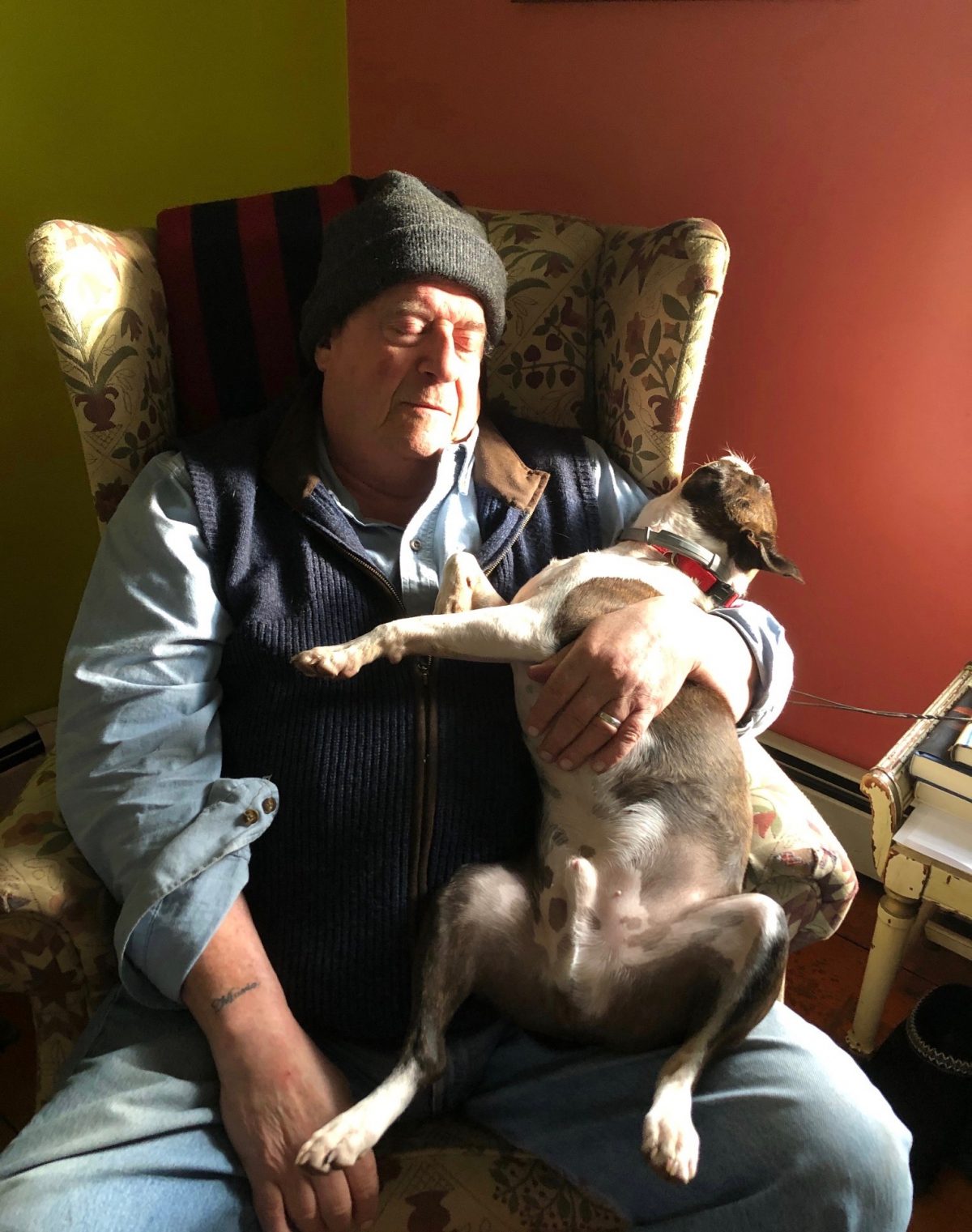There is no experience I know of in the animal world that is deeper or more satisfying than earning the trust of a battered, “rescued” dog.
I will never submit to the manipulative tyranny of people who tell me how to get a dog, or who claim there is only one right way to get a dog.
They are exploiting animals to feel better about themselves, and I’ll never do that.
But rescuing a dog – Bud is my fifth or sixth rescue – is an extraordinary experience. Dogs like Bud have every reason to hate humans (usually male humans). My mission was not only to get him to love me but to trust me.
This photo Maria took of the two of us napping this afternoon is crucial to me, it tells me that Bud is learning to trust me, a hard road for both of us.
I’ve been working with Bud for more than a year now, and the most important work I did with him was building trust.
The most satisfying thing about a dog rescue for me is the creative challenge of figuring out how to win the trust of a dog.
Bud’s first two years were horrific. He was abandoned in an outdoor pen with other dogs and had no regular food or roof or shelter in cold and heat. I gather he survived by eating feces and some occasional table scraps. His penmates didn’t survive.
The other dogs with him died of exposure and starvation one-by-one until neighbors called Friends Of Homeless Animals, and they came out and purchased him from his criminally negligent owner for $150.
Bud was terrified of me at first; if I picked up anything like a stick, he would tremble and cower. Sometimes, he panics unaccountably, as we walk through doors, or if I move abruptly, or towards him suddenly. Sometimes, he just shakes in terror and goes limp. He never runs, he just collapses in a puddle, as if awaiting punishment.
it is a wrenching thing to see.
He does not expect good things from males. When he freezes, I wait, speak to him calmly, I quietly insist that he obey the command, it may take a while, but he is learning that nothing bad will happen to him here. Those memories will never be entirely gone, but they are dimming and weakening.
I am only beginning to understand his triggers, even as they become less frequent. I know some of them will never go away.
A well-bred, well-raised dog quite often has no fear of any kind; they have not experienced the kind of terror that sometimes comes over Bud. It is so much easier to train them and work with them.
I’ve worked hard to earn Bud’s trust, with food, touching, holding, and letting him snuggle next to me, ride with me in the car, and work with me on my calming exercises – simple obedience exercises – done over and over again.
I do calming massage with him, including rubbing his head and doing finger circles on his back and stomach. I talk to him softly, sometimes sing to him. I’ve worked on recalls, sitting, staying, always positive, always rewarding.
Bud understandably loves food, and training treats have helped to open a window of communication to this traumatized animal.
I took a video of his lengthening recall; this has taken a lot of work, repetition, and patience. He doesn’t always come instantly, but still comes.
It was not quick or straightforward. Over time, day by day, bit by bit, Bud has come to trust me, he panics at moments, but these moments are increasingly rare.
One of the things I’ve done is to invite Bud up in my lap when I rest or meditate. More and more, he has come to watch for these moments, he jumps up on my lap and curls over on his back, exposing his stomach to me for scratching or just for resting.
He puts his head on my shoulder or upper arms and falls asleep.
I don’t know quite how this works, but my calming training does calm him and grounds him and also permits him to trust me by making himself vulnerable in the way fearful dogs are very reluctant to do.
Fearful dogs are very reluctant to expose their stomach, that the weakest and most vulnerable part of their body.
As you know, I have no apologies to make to anyone for buying a dog like Zinnia, who I believe will also be a remarkable animal, who draws and gives boundless love.
I doubt I will have to earn her trust in precisely the way I have to earn Bud’s (that makes for a better human), but she will be a big and strong-willed and active working dog, and I will have to train her just as hard and just as long.
Zinnie will grow up to be 60 or 70 pounds; she won’t be napping in my lap. I will work to gain her attention, her trust, and confidence.
Great dogs can come in many ways and from many different places. My suggestion is never to let anyone shame or guilt-trip you into getting any dog but the one you want.
That’s where great dogs come from.
Photo by Maria Wulf

